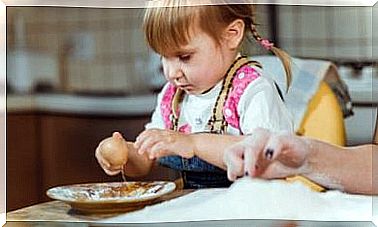What To Do With A Cheeky Answer From Your Child?

Perhaps one of the quickest things parents lose their temper with is when their child reacts aggressively or rudely to a comment or request from them. Does your child ever give a cheeky answer? Then take the following steps.
First of all, remember that during a discussion you don’t react with the same attitude that you are being challenged with. You are the adult. That is why you should avoid being tempted to engage in a meaningless argument in crude terms.
Tips you can apply to a cheeky answer from your child
Stay calm
When such a situation arises, it is not convenient to react in a negative way. The way you react can weaken or strengthen the relationship with your child. So you have to be very careful. If your response is too mild, your child may repeat this behavior. If your response is too strict, he will feel that he is not allowed to express himself.
Do not shout
Avoid yelling and arguing when you are not calm, take a deep breath and think carefully about what you are going to say. Keep the conversation until a moment when both are calm and can come to a reasonable agreement.
Investigate causes of a cheeky answer
Investigate the causes of such situations. Your child’s rude behavior is not always because of problems they have with you. Make sure you find out if it might be an outside situation that is throwing him off. That can be something at school but also in his social environment.
If so, you should definitely not react aggressively. Focus on the cause of the problem and try to help him solve it.
Guard the borders
Maintain clear rules about unacceptable behavior. If you are drafting family rules in front of the children, make it as explicit as possible what specific behavior is expected of them towards their parents and other family members. With clear boundaries, your children will think better before approaching you disrespectfully.

Also remember to check the content of the audiovisual programs accessible to them. Much cheeky behavior stems from imitating behavior they see on their favorite show or on a video or the Internet.
Pay attention to what your children hear and see both on television and in the real world. Do this not only within the family but also in the immediate social environment and at school.
Attaches consequences to a brutal answer
Remind them that every action has consequences. After you have identified the tonalities and words that are unacceptable between parents and children, you must make it clear to them that they must accept the consequences if they cross the line.
Take away privileges such as play time or leisure activities. Give them extra homework or another method that you have agreed with them.

Don’t improvise when punishing inappropriate behavior as this can make the problem worse. Remember that if you set rules from the beginning, living together will be healthier for all.
Set a good example
Act as you expect your child to do. If the discussions with your partner end in insults back and forth, it is perfectly normal for your children to react rudely. Treat everyone in your family and social circle in a way that you would allow and accept from your child.
It is also very important that you respect your children. This way they see that they have to address you in the same tone. Avoid sarcasm and foul language. These can negatively affect small children and adolescents.
Positive encouragement
Confirm their well-behaved behavior and give them extra attention when they behave politely and show respect to others. Encourage acts that are respectful to you or other family members. Don’t let these occasions pass you by. You can motivate them to engage in a friendly interaction under any given circumstance.
Pay attention
Give them enough attention. In many situations, children are rude because they feel ignored. Spend at least an hour a day listening to them, being a part of their activities, and delving into the things that keep them busy.
Let go of your cell phone and the troubles of work for a moment to do something with your kids.









